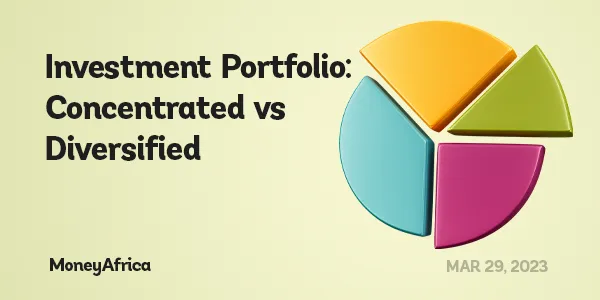Good Morning 😃
How are you doing?
I was in a recent meeting where my client said, “I don’t want any low return assets. “Is it possible to have all my investments in stocks? I was surprised, so I asked him why. He answered, “I have been told the stock market returns are more than the other financial assets, and it is the only way one can become wealthy. So, I see no point putting my money in investments that have no high return potential.”
Some investors are like this client of mine. Some have too many risky investments, while others are playing safe. In today’s article, we shall be addressing how to allocate your investment portfolio.
What is an investment portfolio?
Every industry has its own language, and one term that you will find in the finance industry is “investment portfolio,” which refers to all of your invested assets.
An investment portfolio is a collection of financial assets such as stocks, bonds, real estate, commodities, mutual funds, exchange-traded funds (ETFs), and other investment products that are owned by an individual or an institution.
The purpose of an investment portfolio is to diversify risk by investing in different types of assets and to generate a return on investment over a long period of time. By spreading your investments across multiple asset classes, you can reduce the overall risk of your portfolio while potentially increasing returns.
Should your portfolio be concentrated or diversified?
A concentrated portfolio is one in which an investor holds a relatively small number of investments, typically, ten or fewer. In contrast, a diversified portfolio is one that includes a variety of investments across different asset classes, sectors, and geographies.
Concentrated portfolios can offer the potential for higher returns, as the investor is focused on a select group of investments that they believe will outperform the broader market. However, this approach also comes with higher risk, as the portfolio is more exposed to the performance of a small number of investments. If any one of these investments underperforms, it can have a significant impact on the overall portfolio.
On the other hand, a diversified portfolio seeks to spread risk across a range of investments. By holding a variety of assets, the portfolio is less exposed to the performance of any one investment, which can help to mitigate risk. While diversification may reduce the potential for very high returns, it also helps to limit losses during periods of market volatility.
How to build an investment portfolio?
Determine your investment goals: Before investing, it’s important to consider what you want to achieve with your investments. Are you saving for retirement, building wealth, or looking to generate income? Understanding your investment goals can help you determine the appropriate investment strategy and asset allocation.
Determine your risk tolerance: Consider how much risk you are willing to take on in order to achieve your investment goals. Generally, riskier investments offer the potential for higher returns but also come with greater risk of loss.
Choose your asset allocation: Once you understand your investment goals and risk tolerance, you can choose an asset allocation that is appropriate for your needs. This involves selecting a mix of different asset classes such as stocks, bonds, and alternative investments.
Monitor and adjust your portfolio: Review your portfolio regularly to ensure that it remains aligned with your investment goals and risk tolerance. Make adjustments as the need arises to keep your portfolio on track.
Consider professional advice: Consider seeking professional advice from a financial advisor who can help you build a portfolio that is tailored to your individual needs and goals.
Kindly send an e-mail to info@themoneyafrica.com if you need to speak to a financial advisor to help you create a diversified portfolio.
In conclusion, there is a school of thought that advocates for a concentrated investment portfolio. While this approach can offer the potential for higher returns, it also comes with higher risk as the portfolio is more exposed to the performance of a small number of investments. Therefore, this strategy may be more suitable for investors who have built significant wealth and have a high risk tolerance.
For investors who are just starting out or have a lower risk tolerance, a diversified investment portfolio may be more appropriate. By spreading investments across different asset classes and sectors, a diversified portfolio can help to reduce risk and limit losses during periods of market volatility.
Thank you for reading Money Africa’s Blog.
Please feel free to share it.
MoneyAfrica premium plan
Are you a mid to high-income earner? Do you find communities a bit too busy? You should sign up for our premium plan.

You can learn more about that here.
***
We often get questions regarding how to plan your finances to align with your relocation plans, especially for students seeking to further their studies. As always, we have heard you, and we have put together an e-book to help you navigate this. Follow this link, to get your FREE copy of the e-book: The Japa Encyclopedia.
***
Get our annual subscription and learn more about investing safely and building a solid portfolio in 2023.
Don’t forget to:
- Join our community, if you want to smash your 2023 financial goals. It takes at least 30 days to build great habits that will last you a lifetime. So why not start now? There is a lot you can achieve.
- If you would like to document your financial journey in 2023, then our journal would be an excellent fit for you. It costs ₦7,500 (excluding delivery).
- Get a budget sheet to track your monthly expenses. Click here
- Get an investment tracker to be on top of all your investments. Click here
MoneyAfrica is a financial literacy platform. Our goal is to make everyone better with their finances.
We do this by engagements via our:
– social media handles
– platforms for paid community members (for adults and students)
– webinar sessions with corporate clients
Would you like to join any of the communities? Please click here
Would you like us to hold a webinar for your company’s staff? Please send an email to info@themoneyafrica.com


